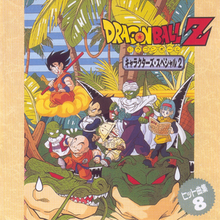- Dragon Ball Z Hit Song Collection 8: Character Special 2
-
Dragon Ball Z Hit Song Collection 8: Character Special 2 Soundtrack album by Various Artists Released September 21, 1991
September 20, 2006Genre Anime Length 10:40 Language Japanese Label Columbia Producer Takashi Uchida Dragon Ball Z Hit Song Collection chronology Dragon Ball Z Hit Song Collection 7: The Journey of the 7 Balls Dragon Ball Z Hit Song Collection 8: Character Special 2 Dragon Ball Z Hit Song Collection 8½: Special Dragon Ball Z Hit Song Collection 8: Character Special 2 (ドラゴンボールZ ヒット曲集8~キャラクターズ・スペシャル2/Doragon Bōru Zetto Hitto Kyokushū Etto~Kyarakutāzu Supesharu Tzu) is the eighth installment of the Dragon Ball Z Hit Song Collection series of the anime Dragon Ball Z. It was released by Columbia Records on September 21, 1991, in Japan only. This album is a follow-up to Dragon Ball Z Hit Song Collection 4: Character Special released in 1990 and is made up of character songs from the Dragon Ball Z cast.
Contents
Album Information
The album initially picks up where the other character special leaves off. Each song in a way, tells their own unique story. "Capsule Corp." or "Capsule Corporation" is simply Bulma making random comments about whatever she's doing, set to a composition eerily similar to Van McCoy's "The Hustle". "Ichido wa Kekkon Shitai Mambo" features Kuririn singing cheerfully about how much he desires to get married. "Vegeta-sama no Oryori Jigoku!!" marks the only character song by Vegeta. Here, he sings about cooking a special Okonomiyaki while giving "battle commands" to his ingredients who sing backup. "Share 'reba Inochi no Izumi Waku-Waku!! 2" is the follow-up to "Share 'reba Inochi no Izumi Waku-Waku!!" which is both performed by the northern Kaio-sama. Once again he continues to tell jokes that he only finds funny. By the end of the song he has succumbed to a fit of laughter. "Kuchibue no Kimochi Piccolo-Hen" is a follow-up to "Kuchibue no Kimochi", Gohan's whistling tune from movie four which was made into a character song for Gohan in Hit 6. This version is done from Piccolo's point of view. As astabished in movie four, Piccolo is sensitive to the sound whistling due to his adept hearing. As a result, for most of the song he complains and begs for the whistler to stop until he gives up and rockets away. Prompting the culprit to reveal them self and laugh at Piccolo. "I•ke•na•i Oo-La-La Magic" features Chi-Chi forcing Gohan to take part in a mother-son karaoke duet as his and Goku's adventures has made Chi-Chi feel left out. Her plan is to compete in the local karaoke circuit with Gohan.
Despite its focus being on character songs, the album also features an image song by "Pochi featuring Apple Pie" called "Omoide no Tenkaichi Budokai". Which recalls the previous budokais in which Goku participated. Also included, the insert song from episode 75 appropriately titled "Takkaraputo Popporunga Pupiritto Paro", which is Porunga's summoning theme.
Track listing
- Cha-La Head-Cha-La
- Capsule Corp.
Capsule Corporation - 一度は結婚したいマンボ
Ichido wa Kekkon Shitai Manbo/The I-Want-to-Get-Married-For-Once Mambo - ベジータ様のお料理地獄ー「お好み焼き」の巻ー
Bejīta-sama no Oryōri Jigoku!!~"Okonomiyaki" no Kan~/Lord Vegeta's Cooking Hell!!: The "Okonomiyaki" Recipe - 想い出の天下一武道会
Omoide no Tenkaichi Budōkai/Memories of the Tenkaichi Budokai - シャレれば命の泉わくわく!!2
Share 'reba Inochi no Izumi Waku-Waku!! Tzu/If I Tell a Joke, It's an Exciting Fountain of Life!! 2 - 口笛の気持ち・ピッコロ編
Kuchibue no Kimochi • Pikkoro Hen/The Feeling of Whistling Piccolo Edit - イ・ケ・ナ・イうららマジック
I•ke•na•i Urara Majikku/The Wrong Kind of Ooh-La-La Magic - タッカラプトポッポルンガプピリットパロ
Takkaraputo Popporunga Pupiritto Paro - でてこいとびきりZENKAIパワー!
Detekoi Tobikiri Zenkai Pawā!/Come Out, Incredible Zenkai Power!
Song Credits
- Hironobu Kageyama
- Hiromi Tsuru as Bulma
- Mayumi Tanaka as Kuririn
- Ryo Horikawa as Vegeta
- Pochi featuring Apple Pie
- Joji Yanami as Kaio-sama
- Toshio Furukawa as Piccolo
- Masako Nozawa as Son Gohan & Naoko Watanabe as Chi-Chi
- Heavy Duty
- Manna
Charts
Chart (1991) Peak
PositionJapanese Albums Chart[1] 76 References
- ^ "Japanese Albums Chart" (in Japanese). ranking.oricon.co.jp. http://ranking.oricon.co.jp/free_contents/search/ranking_list.asp?itemcd=71922&samecd=1&chart_kbn=11A&linkcd=30017690. Retrieved 2011-01-20.
- The album's booklet circa 1991.
Categories:- Dragon Ball soundtrack albums
- 1991 soundtracks
Wikimedia Foundation. 2010.

